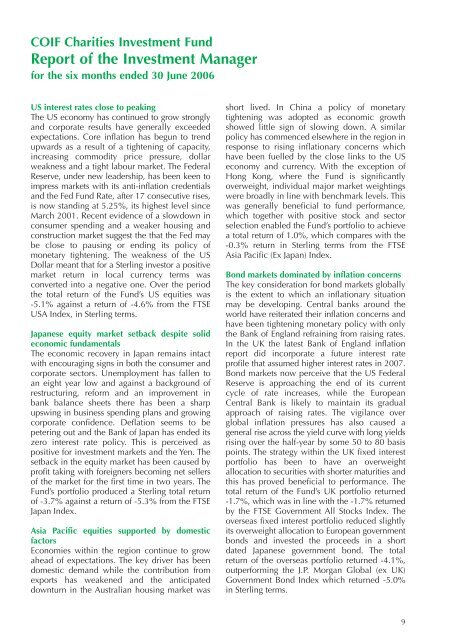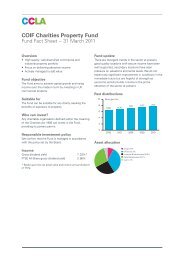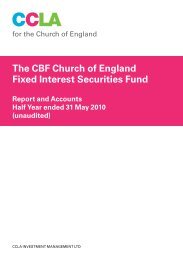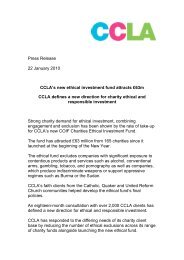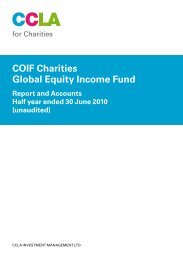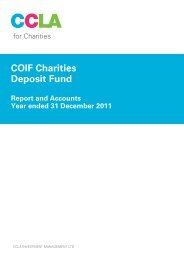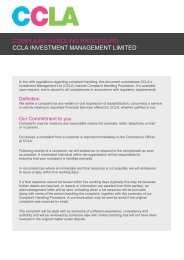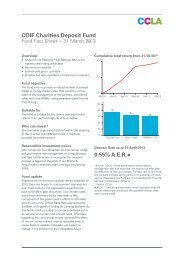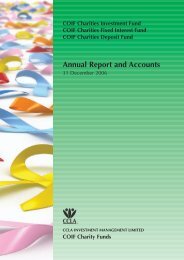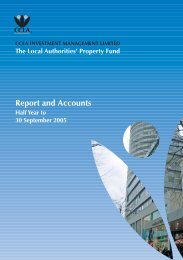COIF Charity Funds - CCLA
COIF Charity Funds - CCLA
COIF Charity Funds - CCLA
You also want an ePaper? Increase the reach of your titles
YUMPU automatically turns print PDFs into web optimized ePapers that Google loves.
<strong>COIF</strong> Charities Investment FundReport of the Investment Managerfor the six months ended 30 June 2006US interest rates close to peakingThe US economy has continued to grow stronglyand corporate results have generally exceededexpectations. Core inflation has begun to trendupwards as a result of a tightening of capacity,increasing commodity price pressure, dollarweakness and a tight labour market. The FederalReserve, under new leadership, has been keen toimpress markets with its anti-inflation credentialsand the Fed Fund Rate, after 17 consecutive rises,is now standing at 5.25%, its highest level sinceMarch 2001. Recent evidence of a slowdown inconsumer spending and a weaker housing andconstruction market suggest the that the Fed maybe close to pausing or ending its policy ofmonetary tightening. The weakness of the USDollar meant that for a Sterling investor a positivemarket return in local currency terms wasconverted into a negative one. Over the periodthe total return of the Fund’s US equities was-5.1% against a return of -4.6% from the FTSEUSA Index, in Sterling terms.Japanese equity market setback despite solideconomic fundamentalsThe economic recovery in Japan remains intactwith encouraging signs in both the consumer andcorporate sectors. Unemployment has fallen toan eight year low and against a background ofrestructuring, reform and an improvement inbank balance sheets there has been a sharpupswing in business spending plans and growingcorporate confidence. Deflation seems to bepetering out and the Bank of Japan has ended itszero interest rate policy. This is perceived aspositive for investment markets and the Yen. Thesetback in the equity market has been caused byprofit taking with foreigners becoming net sellersof the market for the first time in two years. TheFund’s portfolio produced a Sterling total returnof -3.7% against a return of -5.3% from the FTSEJapan Index.Asia Pacific equities supported by domesticfactorsEconomies within the region continue to growahead of expectations. The key driver has beendomestic demand while the contribution fromexports has weakened and the anticipateddownturn in the Australian housing market wasshort lived. In China a policy of monetarytightening was adopted as economic growthshowed little sign of slowing down. A similarpolicy has commenced elsewhere in the region inresponse to rising inflationary concerns whichhave been fuelled by the close links to the USeconomy and currency. With the exception ofHong Kong, where the Fund is significantlyoverweight, individual major market weightingswere broadly in line with benchmark levels. Thiswas generally beneficial to fund performance,which together with positive stock and sectorselection enabled the Fund’s portfolio to achievea total return of 1.0%, which compares with the-0.3% return in Sterling terms from the FTSEAsia Pacific (Ex Japan) Index.Bond markets dominated by inflation concernsThe key consideration for bond markets globallyis the extent to which an inflationary situationmay be developing. Central banks around theworld have reiterated their inflation concerns andhave been tightening monetary policy with onlythe Bank of England refraining from raising rates.In the UK the latest Bank of England inflationreport did incorporate a future interest rateprofile that assumed higher interest rates in 2007.Bond markets now perceive that the US FederalReserve is approaching the end of its currentcycle of rate increases, while the EuropeanCentral Bank is likely to maintain its gradualapproach of raising rates. The vigilance overglobal inflation pressures has also caused ageneral rise across the yield curve with long yieldsrising over the half-year by some 50 to 80 basispoints. The strategy within the UK fixed interestportfolio has been to have an overweightallocation to securities with shorter maturities andthis has proved beneficial to performance. Thetotal return of the Fund’s UK portfolio returned-1.7%, which was in line with the -1.7% returnedby the FTSE Government All Stocks Index. Theoverseas fixed interest portfolio reduced slightlyits overweight allocation to European governmentbonds and invested the proceeds in a shortdated Japanese government bond. The totalreturn of the overseas portfolio returned -4.1%,outperforming the J.P. Morgan Global (ex UK)Government Bond Index which returned -5.0%in Sterling terms.9


